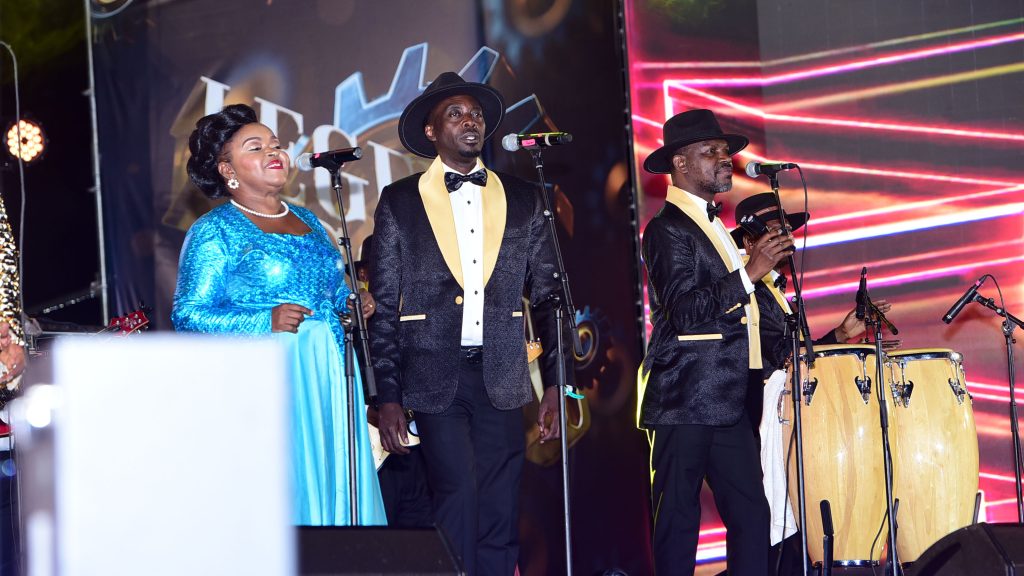Afrigo Band celebrated 50 years in a show at Millennium Gardens in Kampala. The band, formed after the breakup of The Cranes Band — one of the most popular Ugandan groups in the 1960s and 1970s — initially called themselves Africa Go, a name frontman Moses Matovu suggested.
While on the Swangz Avenue-produced Tusker ConverSessions, Matovu said he had suggested two names: Africa Raha and Africa Go.
In August 1975, Africa Go became Afrigo, short for “Africa Go Forward,” with members Moses Matovu, Jeff Ssewava, Charles Ssekyanzi, Paulo Sserumaga, Paddy Nsubuga, Fred Luyombya, Anthony Kyeyune and Geoffrey Kizito.
The band was officially launched on November 1, 1975, when they were invited to play at Bat Valley Bar and Restaurant, later Little Flowers on Bombo Road.
It was, however, after a performance at Cape Town Villa that they gained an unexpected fan — President Idi Amin. The president asked them to become his house band from 1975 until 1979, when he was overthrown.
The band did not become an instant hit after Amin’s regime. They had to deal with the aftermath of his downfall. In the 1980s, they traveled to Kenya for recording sessions and released music, but it wasn’t until 1989 that the tide turned.
That year, Afrigo Band released Vol. 8: Afrigo Batuuse II. The album featured songs such as Afrigo Batuuse, Emmere Esiridde, Mundeke, Speed, Twali Twagalana, and Amazzi Genyama — and it became the turning point.
There was something about Afrigo Batuuse. The song became their signature tune, one they could use to either open or close performances with the same energy. It is referred to as a part two because it wasn’t entirely new when it was released as the title track of the 1989 album.
The original Afrigo Batuuse had been the title track of the band’s 1980 album, which featured songs such as Oswadde Nyo, Tondeka Awaka, Christina, and Abasajja Tulabye. That version, mainly written and performed by Matovu, talked about Afrigo Band’s addictive music and name-dropped members like Fred Luyombya, Paul Sserumaga, Charles Ssekyanzi, Paddy Nsubuga, Eddy Ganja, Said Kasule, James Kibuuka, Saulo Kaliba and Godfrey Mwambala.
Most of them were instrumentalists who also doubled as vocalists, just like Matovu himself.
Later, Afrigo Batuuse inspired another version by Deo Mukungu, an up-tempo arrangement heavy on instrumentals, opening with the now-famous line: “Abaana ba Afrigo batuuse…”
Those opening words have never left the dance floor the same. Whether young or old, the song fills the dance floor — even with people born years after its release.
This became Afrigo Batuuse II, a song and album that changed everything for the band.
There are many songs audiences won’t let Afrigo leave the stage without performing, and this is one of them. Yet, the man behind it spent only five years with the band.
In a 2018 interview with Badru Zziwa of The Observer, Mukungu expressed gratitude for contributing to the band’s catalogue but emphasized that it was a collective effort:
“I came up with the lyrics, but Afrigo is a band,” he said. “It was a collective effort to put that hit together — and that’s what we used to do for every song.”
Mukungu also revealed the song reflected his personal journey into music, including the rift it caused with his family. For instance, the lines “Taata nanvuma, nanvumira endongo / Maama nankuba, lwa ndongo y’Afrigo…” were a true reflection of his father Gabriel Mukungu’s disapproval of his career path as a musician.
Afrigo Batuuse II changed the tide for the band, introducing them to fan bases that had previously ignored them. The album is also said to have attracted international promoters, securing their first UK tour.
Other songs on the album — such as Speed, Amazzi Genyama, Mundeke, and Twali Twagalana — have all gone on to become classics, frequently covered by bands across Kampala.
Speed in particular defined edutainment before the term became popular. The high-tempo, danceable track warns about the dangers of reckless driving. Matovu soulfully pleads with drivers to slow down for the sake of their families, while also paying tribute to those who had died in accidents. Despite the heavy subject matter, the song remains fun, singable, and highly danceable.
After this album, Afrigo dominated both the dance floor and airwaves, going on an historic run that produced albums such as Omutanda Gyali, Mp’e Ddembe, Bwenkanya, Vicent, and Obuganda Abwetisse. These spawned hits like Obangaina, Jim, Nantongo, Vincent, Bwosika Ekitajja, and Olumbe Lw’Obwavu.
Much of the band’s beloved catalogue was either released or reintroduced after Vol. 8: Afrigo Batuuse II.
The album also highlighted Uganda’s longstanding musical ties with Sweden. It was largely produced with the help of Hope Mukasa, who had settled there at the time.
At their golden jubilee concert on Saturday, Afrigo opened their set with Batuuse I before launching into Afrigo Batuuse II — instantly sending the audience into a frenzy. Despite muddy grounds from a day of rain, fans danced, cheered, and sang along with abandon.
Sponsored by Stanbic Bank, the show brought together fans across generations. Some first discovered the band at Ggaba Beach, while others followed them through the many homes of Club Obligatto.
How Afrigo Band has managed to capture audiences’ imagination and excitement every year for five decades remains a puzzle — but perhaps the answer lies in that one song, the anthem that changed everything.
Don’t want to miss out on any story? For updates on all Sqoop stories, follow this link on Telegram: https://t.me/Sqoop and Whatsapp: https://whatsapp.com/channel
Recent Posts
- Tell the truth – Lillian Mbabazi fires back at MC Kats over Fille support claims – Sqoop
- Fefe Bussi tells artists to focus on performance, not outfits during concerts – Sqoop
- My Wife owns my home, Daddy Andre opens up on marriage and respect – Sqoop
- Geosteady readies romantic Valentine’s night for fans – Sqoop
- Music promoters face probe over Shs1.5b – Sqoop
Recent Comments
Post Widget
Social Media Widget

Customer service
It’s not actually free we just price it into the products.

5,000 UGx E-boda Delivery Anywhere in Kampala
Get free your shirt Now
(within the Uganda)

Returns & Exchanges
We offer free returns and exchanges .

Secure payment
Your payment information is processed securely and encrypted.











